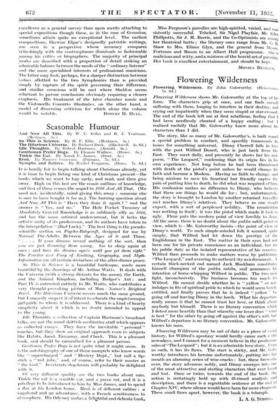Flowering Wilderness
Flowering Wilderness shows Mr. Galsworthy at the top of his form. The characters grip at once, and one fmds Oneself suffering with them, longing to interfere in their destiny, and crying out impatiently when they seem stupid or star-crossed. The end of the book left me at first rebellious; feeling that. I had been needlessly cheated of a happy ending ; but I realized ruefully that Mr. Galsworthy knew more about his characters than I did.
The story, like so many of Mr. Galsworthy's, is built round a special problem in conduct, and speedily transcends its issues for something universal. Dinny Cherrell falls in love with the poet Wilfred Desert, who is just back from the East. They meet daily, and presently he shows her his new poem, " The Leopard," confessing that its origin lies in his own experience. Not long before he had been threatened with death at the pistol's point unless he would change his faith and become a Moslem. Having no faith to change, and being anxious to save his fanatical but friendly captor the pain of putting him to death, he did what was required of him. His confession makes no difference to Dinny,' who believes that there are things he would die for ; but, unfortunately, the story is brought to London by another returned traveller ani reaches Dinny's relativeS. They behave as one would expect, with a sort of perplexed nobility. The recantation was nothing in itself ; it was the pistol which made it look so ugly. Fleur puts the modern point of view forcibly to Jean. All the-same, there is no doubt about the pukka sahib point of view, which is—Mr. Galsworthy insists—the point of' view of Dinny's world. To such simple-minded folk it seemed, quite simply, that Wilfred had let down the prestige of the Englishman in the East. The matter in their eyes had not been one for his private conscience as an individual, but for his public duty as the isolated representative of his country. Wilfred then proceeds to make matters worse by publishing "The Leopard," and averring its authenti _ity as a document. A certain thick-necked cad named Jack Muskham constituto himself champion of the pukka sahibs, and announces his intention of horse-whipping Wilfred in public. The two men fight, inconclusively. The business becomes too much for Wilfred. He cannot decide whether he is " yellow" or not. indulges in fits of spiritual pride to which he would seem bareh entitled, and finally proves that he is indeed " yellow " by going off and leaving Dinny in the lurch. What his departure really means is that he cannot trust her love, or think about anybody but himself. There is no literary convention which I detest more heartily than that whereby one lover does what is best" for the other by going off againit the other's will, but Wilfred's departure is no literary convention. Mr. Galsworthy know4 his man.
Flowering Wilderness may be out of date as a piece of social history, for Wilfred's apostasy would hardly_cause such a stir nowadays, and I cannot for a moment believe in the prodigious sales of "The Leopard" ; but it is an admirable love story. Even as such, it has its flaws. The start is sticky, and Mr. Gals- worthy introduces his heroine unfortunately, putting into her mouth an alarming series of wise-cracks : but, these fireworks over, the story advances nobly, and Dinny emerges into one of the most attractive and sterling characters that ever loved and lost. Once or twice, towards the end of the book, the action is irritatingly held up with ill-timed analysis and description, and there is a regrettable sentence at the end of Chapter XIV, where silence would have been far more eloquent. These small flaws apart, howeVer, the book is a triumph.
L. A. G. STS.






























 Previous page
Previous page